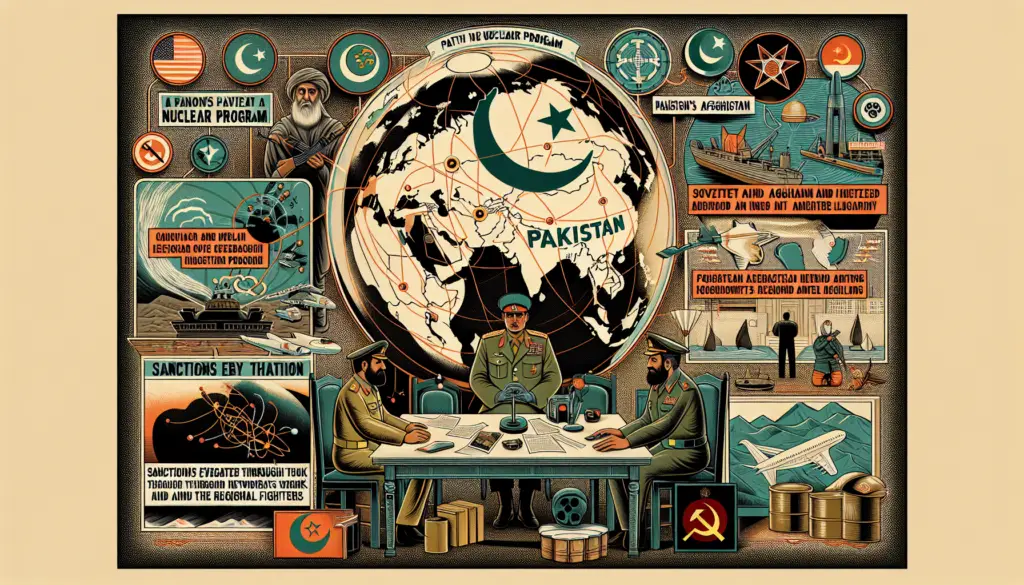The Untold Story of Pakistan’s Nuclear Program: From Zia’s Diplomacy to the Atomic Bomb
Navigating US Sanctions and the Soviet Invasion: Zia’s Diplomatic Prowess
In the tumultuous aftermath of the Cold War, Pakistan found itself at the crossroads of global geopolitics. As the country grappled with the fallout of the Soviet invasion of Afghanistan and the imposition of US sanctions, the leadership of General Zia-ul-Haq emerged as a pivotal force in shaping Pakistan’s foreign policy and national security strategy. This chapter of Pakistan’s history, often overshadowed by the more dramatic events of the time, is a testament to the nation’s resilience and the strategic acumen of its leaders. Central to this narrative is Pakistan’s Nuclear Program, which played a crucial role in defining the country’s stance on international security. The development and progress of Pakistan’s Nuclear Program during this period not only underscored the nation’s scientific and technological advancements but also highlighted the importance of strategic diplomacy in achieving national objectives.
Operation 333: Navigating the US Sanctions Minefield
When the United States imposed sanctions on Pakistan in the wake of its nuclear program, the country faced a daunting challenge. Zia-ul-Haq, however, proved to be a master strategist, devising a covert operation known as “Operation 333” to circumvent the restrictions. This ingenious plan involved the establishment of a network of front companies and intermediaries, allowing Pakistan to continue acquiring the necessary technology and materials for its nuclear ambitions.
Zia’s diplomatic maneuvering was not limited to the West. He also adeptly navigated the complex geopolitical landscape of the region, forging alliances and leveraging regional dynamics to bolster Pakistan’s position. The country’s support for the mujahideen fighters in Afghanistan, for instance, was a strategic move that not only assisted in the fight against the Soviet invasion but also strengthened Pakistan’s regional influence.
The Soviet-Afghan War: Pakistan’s Pivotal Role
As the Soviet-Afghan war raged on, Pakistan found itself at the center of the conflict, providing a crucial lifeline to the mujahideen forces. Zia’s government channeled significant resources and military aid to the Afghan resistance, playing a vital role in the eventual withdrawal of Soviet troops from the region. This strategic decision not only bolstered Pakistan’s regional standing but also served as a testament to the country’s willingness to stand up to superpower aggression.

Related Article : Cuba Missile Crisis: World Stood on the Brink of Nuclear War
The Quest for Nuclear Deterrence: Pakistan’s Atomic Bomb
Amidst the geopolitical tensions and the looming threat of external aggression, Pakistan’s pursuit of nuclear capabilities became a matter of paramount importance. Zia-ul-Haq, recognizing the strategic value of nuclear deterrence, spearheaded the country’s nuclear program, navigating a complex web of international pressure and covert operations.
The Atomic Ambition: From Clandestine Efforts to Successful Detonation
Pakistan’s journey towards acquiring nuclear weapons was a delicate and arduous one, marked by clandestine efforts and a relentless determination to overcome the obstacles. Zia’s government orchestrated a meticulous plan, involving the procurement of critical technologies, the development of indigenous capabilities, and the careful management of international scrutiny.
The culmination of these efforts came in 1998, when Pakistan successfully conducted its first nuclear test, demonstrating its capability to the world. This landmark achievement not only bolstered the country’s national security but also solidified its position as a regional power, capable of deterring potential adversaries and safeguarding its sovereignty.
The Lasting Legacy: Nuclear Deterrence and Regional Stability
The development of Pakistan’s nuclear program under Zia-ul-Haq’s leadership has had a profound and lasting impact on the country’s strategic landscape. The nuclear deterrent has served as a cornerstone of Pakistan’s national security, providing a robust shield against external aggression and ensuring the country’s ability to defend its territorial integrity.
Moreover, the successful acquisition of nuclear capabilities has also played a crucial role in maintaining regional stability. Pakistan’s nuclear program has served as a counterbalance to India’s own nuclear ambitions, fostering a delicate balance of power that has, to a large extent, prevented the escalation of tensions between the two rivals.
Conclusion: Zia’s Vision and Pakistan’s Enduring Strength
The story of Pakistan’s nuclear program, intricately woven with the diplomatic maneuverings of Zia-ul-Haq, is a testament to the country’s resilience, strategic foresight, and unwavering commitment to national security. In the face of daunting challenges, Zia’s leadership and Pakistan’s determined efforts have shaped the nation’s trajectory, solidifying its position as a formidable regional power and a key player in the global geopolitical landscape.
As the world continues to grapple with the complexities of the modern era, the lessons of Pakistan’s nuclear journey serve as a reminder of the importance of bold decision-making, diplomatic acumen, and the relentless pursuit of national interests. The legacy of Zia-ul-Haq and the success of Pakistan’s nuclear program stand as a testament to the country’s unwavering spirit and its ability to overcome adversity, paving the way for a future of continued growth and prosperity.

